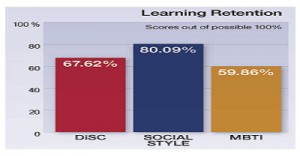Behavioural Style
Human energy is the key resource available in any organisation and is often wasted because of misunderstandings and interpersonal conflict – so called “personality differences”.
“I think I am logical and reserved; you perceive me to be exacting and impersonal”
“I think I am strong willed and decisive; you perceive me to be dominating and unfeeling”
“I feel I am co-operative and supportive; you perceive me to be conforming and pliable”
“I feel I am stimulating and persuasive; you perceive me to be reactive and opinionated”
We have a solution that helps people manage their relationships in ways that prevent conflict and the dilution and diffusion of energy – leaving more time and effort available to get the job done.
Behavioural Style Influencing Skills
Our 360 behavioural style profile, together with a combination of facilitation and coaching, will provide you with the skills and behaviours to exercise flexibility in your personal and business interactions.
Your profile in combination with a practical workbook will provide:
- Feedback on your behavioural communication preferences – your style
- Key insight to your strengths and limitations
- Observational clues and skills to recognise other people’s behavioural preferences
- Skills and processes to apply the key behavioural concept of Flexibility
Flexibility is the skill of situationally adapting your behavioural preferences in order to earn the support and commitment of other people in achieving tasks
We can facilitate generic Behavioural Style Influencing Skills workshops, or use with a combination of Leadership – DNA or Sales –DNA, as part of your Leadership and/or Sales training and development strategy.
BSIS is an excellent base for building a powerful personal development plan.
Increasingly we are using BSIS when working one on one with senior executive personal development plans
Learning to adapt your actions to meet the needs of any situation, and the people in it, is the ultimate outcome of behavioural style awareness.
Research Comparisons: SOCIAL STYLE- DiSC – MBTI
The findings from the first comparative research project* into interpersonal behavioural skills shows that Social Style is easier to understand and apply than Myers-Briggs or DiSC.
* http://onlinelibrary.wiley.com/doi/10.1002/jpoc.20005/pdf
The study found that, while participants in all three programs held very positive reactions to the training programmes, participants in Social Style training scored significantly higher in terms of understanding and retaining course concepts and, most critically in terms of your investment, in using those skills to understand and relate effectively with others.
Our Interpersonal Style profile, researched and validated by W F Daves and C L Holland, further developed the Social Styles Model using the same principles.
Key research findings:
Participant reaction to training: Participants in all three programmes had very positive reactions and perceived them to be very useful. Overall, Myers-Briggs received a slightly higher rating than DiSC and Social Style.
Retention of key concepts: In post-course assessment of retention of key concepts. Social Style training participants scored significantly higher, with an average performance 18% better than DiSC and 34% better than Myers-Briggs.
Applying learning with others: A further evaluation was of the participants’ ability to apply what they learned in the courses when working with others. Each participant was asked to evaluate the behaviours of others and determine their style or type. Social Style training participants were better able to identify the correct style or type, showing almost 50% improvement over DiSC and a massive 280% improvement over MBTI participants.
Identifying effective ways to work with people: Finally, in what is the key business objective in SCA’s BSIS workshops, participants were asked to identify effective ways to work with people based on their Style identifications. Social Style training participants selected appropriate approaches 24% more than DiSC participants and 58% more than MBTI participants and were, therefore, much more likely to select appropriate ways to work with others based on style or type.
In Brief
Lorem ipsum dolor sit amet, consectetur adipiscing elit. Suspendisse vitae augue quis mi convallis consequat vel sed elit. Suspendisse potenti. Praesent ultrices sem nec tellus bibendum et rutrum nibh sagittis. Pellentesque eros orci, adipiscing vel pharetra bibendum, rhoncus vitae est.

